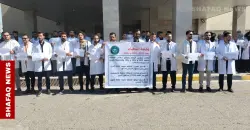Working women in Iraq: Competence vs 'shame and disgrace' stigma

Shafaq News / Working women in Iraq face many challenges, navigating societal norms and cultural expectations that historically constrained their career possibilities. Despite strides in recent years, women's participation in the workforce continues to lag behind men's.
Iraqi women have achieved great success despite obstacles such as gender discrimination, limited access to education and training, and traditional gender roles. More and more are pursuing careers in administration, nursing, and teaching.
In order to boost women's economic empowerment, the Iraqi government has put in place several policies. These include measures to broaden access to education and vocational training, back up female entrepreneurs, and uphold labor laws that safeguard women's rights at work.
Significant obstacles still exist, though, such as a dearth of daycare options, restricted employment prospects, and security worries. Furthermore, women frequently experience social and cultural constraints that deter them from pursuing particular professions or working outside the home.
Even though they are competent and have earned advanced degrees, women in central and southern Iraq have difficulty finding work. These difficulties are a result of social, cultural, and familial factors because women are still not fully accepted in the workforce by society, which still sees them as a "shame and disgrace."
Nevertheless, despite the nation's difficult economic circumstances, Iraqi women try to support their families by depending on themselves in many spheres of life, especially labor. To attain gender equality and increase women's participation in all areas of public life, there are calls for giving women more economic, social, legal, political, and leadership opportunities.
Activist Israa Al-Adib asserted that "women face difficulties in finding employment in central and southern Iraq despite their competence and attainment of higher academic degrees. This is due to the diminishing environment, geographical constraints, and societal norms and traditions. Additionally, there is systematic violence from companies and tribes, alongside a sense of shame attached to their work. Consequently, women often find themselves relegated to a secondary status within society."
Karbala governorate native Al-Adib stressed that "economic integration is crucial for women to secure multiple jobs and contribute to revitalizing the economy."
As per al-Nahrain Centre for Strategic Studies and Research findings, roughly 29% of Iraqi women are employed in the private sector.
Even though women make up about 49% of the population in Iraq, there are still few job options for them. Out of over twenty million Iraqi women, only 15% are employed; 85% of these women are victims of external circumstances that impede their ability to play a role in society at large and in the labour market in particular.
In this context, feminist activist Ruqqaya Salman, from Basra governorate, pointed out that "women face difficulty in finding employment despite possessing the required qualifications."
Salman elaborated that "this is due to various reasons, including the overall economic deterioration in Iraq, particularly in the central and southern governorates. In addition to recruiting procedures that are biassed and nepotistic, the bulk of investment is concentrated in particular cities."
A report by the World Bank in 2020 highlighted that "less than 15% of women participate in the labor market in both Iraq and Jordan and only 26% in Lebanon," indicating that "these percentages represent among the lowest rates of female labor force participation worldwide."
The decline in women's status in central and southern Iraq, according to Professor Israa Al-Joorani, is due to "the suppression of competencies despite the existence of opportunities, as there is empowerment of unqualified individuals in positions based on favoritism, with most opportunities going to parties and quotas."
Al-Joorani told Shafaq News Agency that "all opportunities are available, but there are those who impose restrictions and conditions that can lead to marginalising and even combating competency."
She stated, "The major problem facing the country is the placement of individuals who are not specialized in their field of work because the highest authority managing the institution brings in people under their control to manipulate state institutions."
Al-Joorani asked the "relevant authorities to end this phenomenon and establish oversight bodies and specialized committees to evaluate operations in institutions and government departments."
According to a study conducted by the Iraqi Ministry of Planning's Gender Statistics Unit of the Central Statistical Organisation, women's employment patterns do not seem balanced, with some industries having higher rates of female participation than others.
Regarding women's participation, the public sector is the most appealing, with around 78% of them, whereas the private sector only has about 21%. It is noteworthy that rural women make up the majority of private sector employees.
As per the study, the working environment for women is comparatively less hazardous than men's. According to the findings, over 82% of women and over 46% of men work in safe environments.
On the other hand, Majid Al-Khayyat, the director of the Iraqi Center for Media Studies and Research, indicated that "the limited job opportunities for women in certain fields are due to market disparities. When job opportunities are available, applicants should undergo competency assessments, and the most qualified should be selected for the position."
He added, "However, the evaluation system in the country overall is unfair and inaccurate. The fact that worthy applicants are not given employment opportunities but undeserving ones are suggests that there is a problem with institutional management, partiality, and suspicion of corruption as a result of the absence of justice. To maintain their integrity, institutions must be reevaluated in light of this."
According to figures and data previously released by the International Labour Organization on gender equality, the Arab female participation rate in the labor market was 18.4%, the lowest rate globally compared to the world average of 48%.





